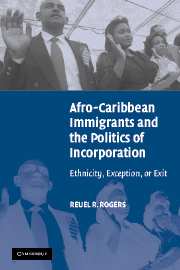Book contents
- Frontmatter
- Contents
- List of Tables
- List of Illustrations
- Acknowledgments
- Strangers at the Gate: Immigrant Political Incorporation in a New Century
- 1 Beyond Black and White: Theories of Political Incorporation
- 2 “Good” Blacks and “Bad” Blacks?
- 3 Letting Sleeping Giants Lie
- 4 Afro-Caribbeans and African Americans: Racially Bound or Ethnically Splintered?
- 5 Afro-Caribbean Sojourners: Home Country Ties and the Hope of Return
- 6 Black Like Who? Afro-Caribbean Immigrants, African Americans, and the Politics of Group Identity
- 7 Black Ethnic Options
- Conclusion: Reconsidering Political Incorporation and Race
- Appendix A Methodology
- Appendix B Interview Schedules
- Bibliography
- Index
Conclusion: Reconsidering Political Incorporation and Race
Published online by Cambridge University Press: 07 November 2009
- Frontmatter
- Contents
- List of Tables
- List of Illustrations
- Acknowledgments
- Strangers at the Gate: Immigrant Political Incorporation in a New Century
- 1 Beyond Black and White: Theories of Political Incorporation
- 2 “Good” Blacks and “Bad” Blacks?
- 3 Letting Sleeping Giants Lie
- 4 Afro-Caribbeans and African Americans: Racially Bound or Ethnically Splintered?
- 5 Afro-Caribbean Sojourners: Home Country Ties and the Hope of Return
- 6 Black Like Who? Afro-Caribbean Immigrants, African Americans, and the Politics of Group Identity
- 7 Black Ethnic Options
- Conclusion: Reconsidering Political Incorporation and Race
- Appendix A Methodology
- Appendix B Interview Schedules
- Bibliography
- Index
Summary
Unprecedented numbers of non-white and non-European immigrants have entered the United States over the last four decades and now pose a historic challenge for the American democratic experiment. The arrival of these newcomers marks the first time this country has confronted the challenge of incorporating large numbers of non-European, non-white voluntary immigrants into the political system. To be sure, the United States has a long record of proven success in absorbing immigrants into its political, civic, economic, and social life. Indeed, this country has a long-standing global reputation for integrating newcomers from abroad. The process has not always been seamless; nor has the welcome always been warm. But immigrants to the United States historically have been able to achieve political incorporation. They have managed to adapt to the country's civic norms, participate in the political process, even influence its outcomes, and by doing so, they have reinvigorated and legitimized American democracy.
Yet the majority of the immigrants in this well-known saga of successful incorporation have immigrated from Europe. The fact that most of today's foreign-born newcomers, in contrast, are non-white, non-European racial minorities prompts questions and even doubts about whether they too will be able to achieve the standard of political incorporation attained by their European predecessors. Although this country's reputation for integrating immigrants is relatively strong, its record of incorporating non-white, non-European racial minorities has been problematic and mixed at best.
- Type
- Chapter
- Information
- Afro-Caribbean Immigrants and the Politics of IncorporationEthnicity, Exception, or Exit, pp. 234 - 254Publisher: Cambridge University PressPrint publication year: 2006



